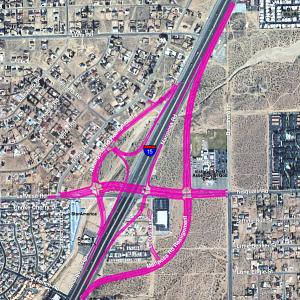VICTORVILLE – The City Council on Tuesday unanimously adopted its Measure I Five-Year Capital Improvement Plan, while acknowledging that forthcoming transportation improvement funds would be tied up in payments over La Mesa/ Nisqualli Interchange construction costs.
According to a staff report by Director of Public Works & Water Sean McGlade, “The (Measure I) revenue that would be received by the city is being withheld by SANBAG to pay for the city’s estimated remaining share of $11,576,175 for the La Mesa/ Nisqualli/ I-15 Interchange project in accordance with the cooperative agreement between the city and SANBAG.”

Aerial view of La Mesa/ Nisqualli Interchange
The city’s actual Measure I revenue for fiscal year 2012-2013 was $4.2 million, according to the report. Based on revenue estimates by San Bernardino Association of Governments, which served as the lead agency for the construction phase of the interchange project, the revenue probably will be withheld until about March of 2017.
The funds, generated through a countywide 0.5 percent retail transaction and use tax, can only be used for transportation improvement and traffic management programs authorized by SANBAG, which acts as the San Bernardino County Transportation Authority.
“Some specific projects that are in the plan for future fiscal years will likely be revised after the city receives an updated pavement management system report that will be used to select future street rehabilitation projects,” McGlade said in his report. “City traffic signal maintenance, signing, striping, traffic engineering, match commitments to projects, and a scaled back pavement rehabilitation will rely on the carry over balance in Measure I for the next two and a half years.”
According to the 2013-2018 expenditure strategy for Victorville’s Measure I Capital Improvement Plan, expenditures are balanced between different categories of projects based on the city’s needs. Project categories include capacity increasing, reconstruction & rehabilitation, preliminary engineering/ environmental studies, right of way acquisition, and final design. Other categorical expenditures include maintenance of roads, traffic controls and traffic signals.
* * *
While referring to a list of city projects to be funded by Measure I at Tuesday’s meeting, Mayor Jim Cox pointed out how a “lot of money” has been estimated and expended with the La Mesa/ Nisqualli Interchange project.
“Would it be difficult for staff to come back and show us what was budgeted and what was expended?” the Mayor asked McGlade. “We were told that the project was a bargain because it had come in under (original) estimates, but we don’t see that in this kind of graph, and I’m a little curious of what the savings was.”
McGlade said he expected that all costs “will be closed out” by January, and staff would come back with a final accounting.
“That would help, because we’re all hoping there would be money left over that we can reallocate,” Mayor Cox said.
Councilman Jim Kennedy pointed out that the original engineering estimates “were so much higher” for the construction cost.
“Yes, that’s true,” McGlade said. “The engineering estimate was higher at what the actual bid was.”
City Manager Doug Robertson explained that regardless of the lower-than-expected construction cost of the interchange, “we’re still looking at probably about two and a half years until we start receiving Measure I (funding) again, and then probably six to eight – to maybe even 10 years – of use of incoming road DIF (Development Impact Fees) to repay the loan.”
* * *
According to an Aug. 19 SANBAG news release, the total construction cost for the La Mesa/ Nisqualli Interchange was approximately $70 million.
In December 2012, the SANBAG Board of Directors awarded an approximately $31.8 million construction contract to Riverside Construction Company. The City of Victorville and SANBAG then announced that construction of the interchange was coming in nearly 26 percent (that is, $15.3 million) under budget due to construction bids coming in lower than expected.
Those savings were expected to be split between the City of Victorville and SANBAG – as both agencies expected to reallocate $7.6 million each for future road and transportation projects.

